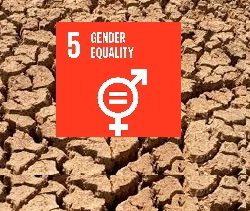
The Rise of Gender Equality

Gender equality is something we need for myriad reasons. It’s better for our health, better for our economy, better for our families and, according to UN data, crucial for defeating climate change.
Climate change and gender inequality are, in fact, very closely linked, both being major injustices of our time that need solutions and are areas that see a great deal of attention from various sources.
More notable though is the truth that women are more impacted by the effects of climate change.
At the same time it should be highlighted that women are dead centre in the fight to save our world. Let’s look at the ways climate change and gender inequality are interlinked and what’s being done to fight back.
First let’s look at women’s role in agriculture. Women actually contribute 45-80 percent of the food production in developing countries. Climate change is having and will have a major effect on our ability to grow food so it is clear to see how women are being affected and will be affected by the effects of climate change.
Drought and increasing temperatures (the double assault) are damaging our ability our grow food. This, of course, affects both farmers’ ability to nourish themselves and earn a living. Women across the globe are suffering but women in developing countries are managing the brunt of the negative effects. Suffering from inadequate access to food, water and health services or dealing with increased levels of domestic violence women in developing countries are truly being put in nightmare situations.
The good news is we are taking steps to mitigate the damage. Mali and Malawi, for example, are working with women to introduce new agriculture techniques in order to maintain and increase crop levels. Mali’s AgriFed program is producing promising results and will likely be expanded further across the country. Bolivia has created the Bolivian Platform against Climate Change and is using the Bolivian Institute for Empowerment of Farmer Communities (INCCA) to help push out info on eco-friendly farming practices. These are vital initiatives we should be supporting.
Of course the climate change issue covers more than just food. Fossil fuels are also a major factor.
How we obtain and use energy is very important to our daily lives and a contributing factor to climate change. Fossil fuels are destroying us and we need a solution, well, yesterday.
Sadly, parts of the world have had no access to alternative clean(er) energy sources. With no access to the power grids favoured by developed nations these communities have to rely on fossil fuels like oil and kerosene to power their houses. These are not healthy power sources (for a number of reasons) and the fumes they emit directly affect the health of the people doing household chores—a.k.a. women.
There are groups working to combat this injustice. KawaSafi is offering funding in Rwanda and Kenya in order to grow the solar energy market, then training women to serve as solar technicians and supporting women-run solar businesses.
Solar Sister is another collective aiming to reverse gender inequality and climate change through clean-energy-powered innovations. Knowing both the dangers of energy poverty and energy pollution Solar Sister aims to use clean energy technology to provide women with new economic opportunities.
These initiatives have the potential to bring in so much positive change—change we need to ensure humanity’s survival.
Although each section of the world has different social dynamics and environmental factors the need for a healthy world is something that can unite us. Enter Women 2030, a coalition formed by five network organizations (Asia Pacific Forum on Women, Law and Development; Gender and Water Alliance; Global Forest Coalition; WECF International; and Women Environmental Programme) for the purpose of ensuring humanity’s quest to meet the SDGs does not ignore the needs of women.
This project, which is being implemented in 50+ countries spanning the globe, aims to increase the global presence of sustainable development. Its presence and members, by attending vital events like the yearly summit on the SDGs—the High Level Political Forum (HLPF)—is making sure women’s voices are not left out or ignored in climate change decisions.
This is a good step towards solving these issues.
We need to limit the effects of climate change. If we want to survive, if we want to thrive, heck, if we want the planet to outlive us we need to limit the damage we are doing.
Knowing the routes we can take to limit our damage and adapt to the new world order is very important.
We also need to be aware of how our changing climate is impacting the different segments of humanity. Solutions need to be found to help those bearing the greatest burden from climate change.
The good news? We seem to know this and organizations across the globe are working to find the right solution.
Even the UN is on board. The United Nations Framework Convention on Climate Change (UNFCC) has a Women and Gender Constituency (WGC) to ensure the needs of women are not being overlooked in the fight against climate change.
If we want to save the planet defeating gender inequality is a must. Are you ready to join the fight?

